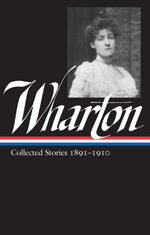From Edith Wharton: Collected Stories 1891–1910
Interesting Links
Moved by a story, Henry James writes to Edith Wharton for the first time (Reader's Almanac)
Previous Story of the Week selection:
“Kerfol,” Edith Wharton
Buy the book
 Edith Wharton: Collected Stories 1891–1910
Edith Wharton: Collected Stories 1891–1910
The Touchstone • Sanctuary • The Eyes • 35 others • 928 pages
List price: $40.00
Web store price: $31.50
The period between Edith Wharton’s marriage in 1885 at the age of twenty-three and the publication of The Greater Inclination, her first collection of stories, in 1899 is, biographer Hermione Lee confirms, “more obscure to us than her later years as a famous novelist.” We do know that, after her marriage, Wharton was quite often afflicted with various ailments; we also know that she was disappointed by the lack of passion and intellectual affinity in her marriage (Lee agrees with other biographers that the union was a “disaster”). The formidable Wharton scholar R.W.B. Lewis attributes the recurrent illnesses not only to the unsatisfactory relationship with her husband, but also to “society’s and her mother’s distrust of a person of good family who took seriously to writing. One can only employ the phrase ‘severe identity crisis’ to describe the terrible and long-drawn-out period Edith Wharton was passing through.” Moved by a story, Henry James writes to Edith Wharton for the first time (Reader's Almanac)
Previous Story of the Week selection:
“Kerfol,” Edith Wharton
Buy the book
 Edith Wharton: Collected Stories 1891–1910
Edith Wharton: Collected Stories 1891–1910The Touchstone • Sanctuary • The Eyes • 35 others • 928 pages
List price: $40.00
Web store price: $31.50
The upshot was that it took the author more than five years (rather than the six months promised to her editor) to complete her first book—a period of hesitation and self-doubt that virtually vanished afterward, when, Lewis notes, “her fiction-writing energy never let up.” She later wrote in A Backward Glance:
I felt like some homeless waif who, after trying for years to take out naturalization papers, and being rejected by every country, has finally acquired a nationality. The Land of Letters was henceforth to be my country, and I gloried in my new citizenship. The publishing of The Greater Inclination broke the chains which had held me so long in a kind or torpor. For nearly twelve years I had tried to adjust myself to the life I had led since my marriage. . . .Although, Lee reminds us, some of Wharton’s illnesses were “real enough” and certainly didn’t vanish with her newfound respect as an author, there is little doubt that the success of her first book of fiction—which received strong reviews and sold a respectable 3,000 copies—served as an turning point in her life.
It is not surprising, then, that of the handful of stories written during the 1890s, three were tales of marital misery. “A Journey” features a wife traveling with her terminally ill husband by train to New York. (Lewis suggests that there may be a bit of wishful thinking here on Wharton’s part.) The journey itself becomes a metaphor for an unhappy marriage: “Life had a grudge against her; she was never to be allowed to spread her wings.” If there’s an epilogue to this story, perhaps it’s to be found in the increasing distance in subsequent years between Edith and Edward Wharton, leading to their inevitable divorce in 1913.
* * *
As she lay in her berth, staring at the shadows overhead, the rush of the wheels was in her brain, driving her deeper and deeper into circles of wakeful lucidity. . . . If you don't see the full story below, click here (PDF) or click here (Google Docs) to read it—free!This selection may be photocopied and distributed for classroom or educational use.